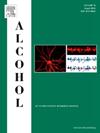成年早期饮酒增加雌性APP/PS1小鼠蓝斑神经元的易感性和淀粉样蛋白病理。
IF 2.9
4区 医学
Q3 PHARMACOLOGY & PHARMACY
引用次数: 0
摘要
酒精使用障碍是最常见的物质滥用障碍,阿尔茨海默病(AD)是最常见的神经退行性疾病。有证据表明,饮酒可能会增加患痴呆症和阿尔茨海默病的风险。蓝斑(LC)是酒精和AD的影响可能汇合的区域。LC是一种去肾上腺素能核,在AD中极易变性,LC神经元的丧失与淀粉样蛋白(Abeta)病理增加有关。本研究通过APP/PS1小鼠模型研究了成年早期饮酒是否会影响LC变性和β。雌性APP/PS1小鼠进行了为期8周的慢性间歇获取(IA)酒精消费范式,随后进行了23周的禁欲;饮水对照受试者平行进行实验。APP/PS1小鼠酒精浓度为IA后,LC神经元数量减少21.9%,支配初级运动皮质的去甲肾上腺素能轴突长度减少。此外,这种酒精诱导的LC缺陷与初级运动皮层中Abeta病理的增加有关。与雌性APP/PS1小鼠的结果相反,非转基因雌性受试者在戒酒后,轴突长度没有缺陷,LC神经元数量仅减少9.4%。我们的研究结果表明,成年早期饮酒增加了雌性APP/PS1小鼠LC神经元对变性的易感性,并加剧了Abeta病理,这为酗酒史可能影响AD的发展轨迹和严重程度提供了证据。本文章由计算机程序翻译,如有差异,请以英文原文为准。
Alcohol consumption during early adulthood increases the vulnerability of locus coeruleus neurons and amyloid beta pathology in female APP/PS1 mice
Alcohol use disorder is the most common substance misuse disorder and Alzheimer's disease (AD) is the most common neurodegenerative disease. Evidence suggests that alcohol consumption may increase the risk for developing dementia and AD. The locus coeruleus (LC) is a region wherein the impact of alcohol and AD may converge. The LC is a noradrenergic nucleus that is highly vulnerable to degeneration in AD, and loss of LC neurons is associated with increased amyloid beta (Abeta) pathology. The present study examined whether alcohol consumption during early adulthood impacts LC degeneration and Abeta using the APP/PS1 mouse model. Female APP/PS1 mice underwent an eight-week chronic intermittent access (IA) alcohol consumption paradigm followed by twenty-three weeks of abstinence; water-consuming control subjects were run in parallel. APP/PS1 mice that had IA to alcohol showed a 21.9% decrease in the number of LC neurons and a decrease in the length of noradrenergic axons innervating the primary motor cortex. Furthermore, this alcohol induced LC deficit was associated with an increase in Abeta pathology in the primary motor cortex. In contrast to results from female APP/PS1 mice, there were no deficits in axon length and only a 9.4% decrease in the number of LC neurons in non-transgenic female subjects after abstinence from IA to alcohol. Our results demonstrate that alcohol consumption during early adulthood increases the vulnerability of LC neurons to degeneration and exacerbates Abeta pathology in female APP/PS1 mice, providing evidence that a history of alcohol abuse may impact the trajectory and severity of AD.
求助全文
通过发布文献求助,成功后即可免费获取论文全文。
去求助
来源期刊

Alcohol
医学-毒理学
CiteScore
4.60
自引率
4.30%
发文量
74
审稿时长
15.6 weeks
期刊介绍:
Alcohol is an international, peer-reviewed journal that is devoted to publishing multi-disciplinary biomedical research on all aspects of the actions or effects of alcohol on the nervous system or on other organ systems. Emphasis is given to studies into the causes and consequences of alcohol abuse and alcoholism, and biomedical aspects of diagnosis, etiology, treatment or prevention of alcohol-related health effects.
Intended for both research scientists and practicing clinicians, the journal publishes original research on the neurobiological, neurobehavioral, and pathophysiological processes associated with alcohol drinking, alcohol abuse, alcohol-seeking behavior, tolerance, dependence, withdrawal, protracted abstinence, and relapse. In addition, the journal reports studies on the effects alcohol on brain mechanisms of neuroplasticity over the life span, biological factors associated with adolescent alcohol abuse, pharmacotherapeutic strategies in the treatment of alcoholism, biological and biochemical markers of alcohol abuse and alcoholism, pathological effects of uncontrolled drinking, biomedical and molecular factors in the effects on liver, immune system, and other organ systems, and biomedical aspects of fetal alcohol spectrum disorder including mechanisms of damage, diagnosis and early detection, treatment, and prevention. Articles are published from all levels of biomedical inquiry, including the following: molecular and cellular studies of alcohol''s actions in vitro and in vivo; animal model studies of genetic, pharmacological, behavioral, developmental or pathophysiological aspects of alcohol; human studies of genetic, behavioral, cognitive, neuroimaging, or pathological aspects of alcohol drinking; clinical studies of diagnosis (including dual diagnosis), treatment, prevention, and epidemiology. The journal will publish 9 issues per year; the accepted abbreviation for Alcohol for bibliographic citation is Alcohol.
 求助内容:
求助内容: 应助结果提醒方式:
应助结果提醒方式:


